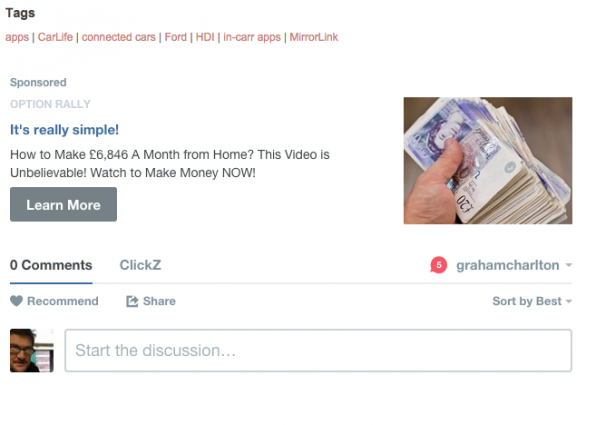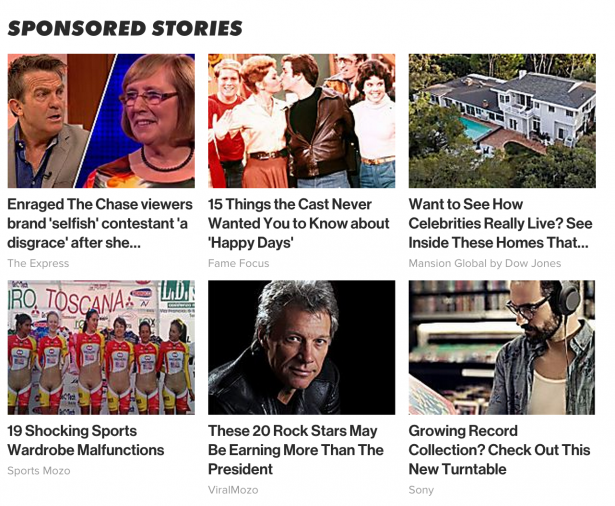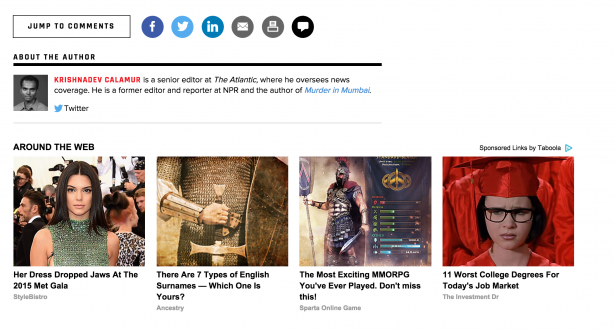It has now become almost impossible to read news online without encountering recommendations for related content.
In the main, it’s garbage. Clickbait articles which will lead your viewers to some very low quality sites. News I noticed this week suggests it may become worse.
The Taboola and Disqus deal
Disqus, which provides the comments functionality on this and many other websites has signed a deal with Taboola to bring content recommendations to Disqus users.
As the release states:
Partnering with Disqus allows Taboola’s platform to reach long tail sites that up until now could not have leveraged Taboola’s capabilities. The Disqus platform extends to more than 3.5 million publisher sites globally in over 190 countries.
In short, more sites will now show these related content recommendations. What wonderful news that is.
It also seems that this will be opt-out rather than opt-in for publishers, so this will appear unless site owners remove it.
In a similar way, Disqus recently started displaying ads like this underneath comments on ClickZ:
I disabled it as soon as I figured out how to, but I wasn’t impressed with the fact that these ads were implemented without any warning. So heres a warning to look out for this.
Content recommendations, it’s not all bad
Now there’s nothing wrong with the concept content recommendation in itself. Indeed, you’ll see some at the foot of this article.
Hopefully, they’ll be relevant, some people will click on them, and spend a bit more time on this site. (And reduce our bounce rates).
This, to me, is how content recommendation should be done. I.e. related content relevant to the page the user is on. It should be a tool for publishers to increase their sites’ ‘stickiness’ and help to surface useful content for readers.
However, the way it has been implemented by Taboola, Outbrain and others leaves a lot to be desired, and it isn’t making the internet a better place. Far from it.
Why content recommendations (mainly) suck
The result of the popularity of content recommendation tools is that many publishers have just decided to show their readers this kind of garbage (this is from an NY Post article on The Ramones:
Now, the more sensible web user will know better than to click these things, but people obviously do, or else publishers would have stopped using these things.
Let’s click on the Happy Days article, I’d love to know what The Fonz doesn’t want me to know (apparently Mickey Dolenz was initially up for the role).
Well, we enter into the kind of web page you’d normally run a mile from:
The article, even if it was interesting or entertaining, is virtually unreadable as it’s 90% ads / 10% content. Oh, and it’s split over 15 pages, which is just great for the reader.
If we follow the trail, we then have even more recommendations (17 Celebs Who Said No To Thigh Gaps and more). Very soon, by following these links, you’re in some of the worst parts of the internet with many pop-ups, autoplaying audio ads, rollovers etc covering your screen. Not to mention the low quality of the content on offer.
Now, this example was from the New York Post, but publishers which would consider themselves more upmarket – Bloomberg, Guardian, The Atlantic etc – still use these things. The New York Times, to its credit, doesn’t.
The recommendations on these sites are slightly less salacious than on others, but still stick out like a sore thumb in the context of the content.
These are the recommendations shown at the foot of an article on Vladimir Putin in The Atlantic.
They’re not especially relevant to the article, and I think such links aren’t great for such sites’ reputations.
There’s also the fact that these publishers seem to be recommending this content in the eyes of readers, thus giving low quality sites more credibility than they deserve. As this article explores, sites like Bloomberg are hosting related content which leads to some fairly shady products.
Why content recommendation tools don’t work so well
The theory behind such tools is sound enough. The recommendation engines learn from the content and sites which users click on and show more of them, less of the rest.
This could produce content recommendations which are relevant to the site hosting them and the articles they appear beneath. In practice, it doesn’t work like that.
What this produces is a race to the bottom. The articles that attract traffic are pure clickbait, the sites hosting such clickbait are low-quality, normally celebrity gossip, sales pitches, and flesh.
It works for the recommendation engines as they’re making money. The publishers hosting the clickbait get more traffic so they’re happy, and the publishers displaying the related content get paid too.
In summary
Publishing online is not an easy business, and I understand the pressures publishers face in monetising their content.
However, as with the issues around intrusive and annoying ads and the use of adblockers, publishers are putting revenue ahead of user experience.
Yes, revenue matters, and there sometimes has to be a compromise between the two, but presenting garbage ads and links t readers isn’t a great long-term strategy.
The article Does the web really need any more content recommendations? was first seen from https://searchenginewatch.com




No comments:
Post a Comment